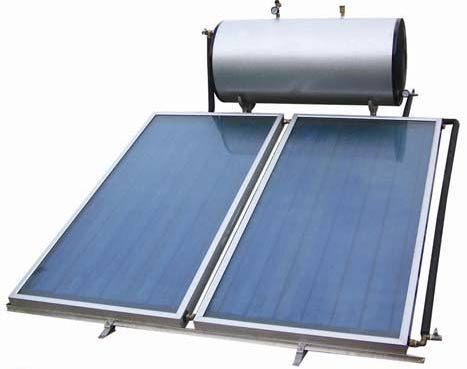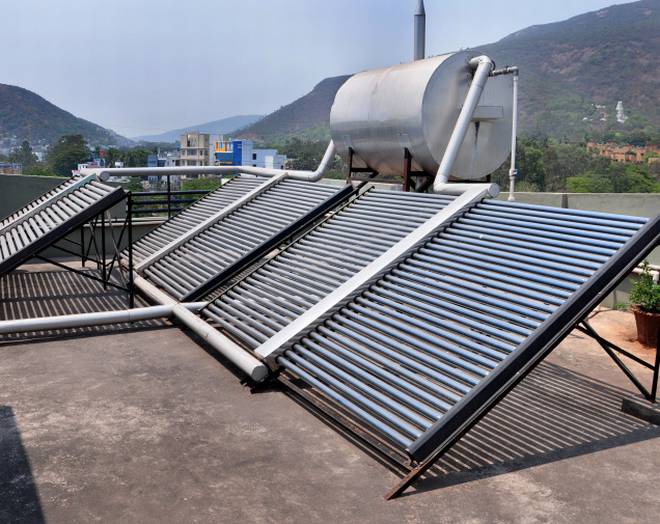We are blessed with Solar Energy in abundance at no cost. The solar radiation incident on the surface of the earth can be conveniently utilized for the benefit of human society. One of the popular devices that harness the solar thermal energy is solar water heater or solar hot water system (SHWS). A Solar Water Heater utilizes heat energy of Sun Rays (solar energy) to increase temperature of water and stores this heated water in an insulated tank, for use throughout the day.
What are Solar Water Heaters
A solar water heater consists of a collector to collect solar energy and an insulated storage tank to store hot water. The solar energy incident on the absorber panel coated with selected coating transfers the hat to the riser pipes underneath the absorber panel. The water passing through the risers get heated up and is delivered the storage tank. The re-circulation of the same water through absorber panel in the collector raises the temperature to 80 C (Maximum) in a good sunny day. The total system with solar collector, storage tank and pipelines is called solar hot water system.
Broadly, the solar water heating systems are of two categories. They are: closed loop system and open loop system. In the first one, heat exchangers are installed to protect the system from hard water obtained from borewells or from freezing temperatures in the cold regions. In the other type, either thermosyphon or forced circulation system, the water in the system is open to the atmosphere at one point or other. The thermosyphon systems are simple and relatively inexpensive. They are suitable for domestic and small institutional systems, provided the water is treated and potable in quality. The forced circulation systems employ electrical pumps to circulate the water through collectors and storage tanks.
The choice of system depends on heat requirement, weather conditions, heat transfer fluid quality, space availability, annual solar radiation, etc. The SHW systems are economical, pollution free and easy for operation in warm countries like ours. Based on the collector system, solar water heaters can be of two types.
- Flat Plate Collectors (FPC) based Solar Water Heater
- Evacuated Tube Collectors (ETC) based Solar Water Heaters
A Solar water heater system includes mainly 3 parts:
- Collector – which raises temperature of water
- Storage Tank – which stores this heated water
- Water Pipelines connecting the different parts.
Capacity of Solar Water Systems
The capacity or rating of solar water heaters is defined by amount of water that it can warm – LPD – liters per day. Solar water heaters (SWHs) of 100-300 litres capacity are suited for domestic application i.e. a family of 4-10 members.
Salient Features of Solar Water Heating System
- Solar Hot Water System turns cold water into hot water with the help of sun’s rays.
- Around 60 deg. – 80 deg. C temperature can be attained depending on solar radiation, weather conditions and solar collector system efficiency.
- Hot water for homes, hostels, hotels, hospitals, restaurants, dairies, industries etc.
- Can be installed on roof-tops, building terrace and open ground where there is no shading, south orientation of collectors and over-head tank above SWH system
- SWH system generates hot water on clear sunny days (maximum), partially clouded (moderate) but not in rainy or heavy overcast day
- Only soft and potable water can be used
- Stainless Steel is used for small tanks whereas Mild Steel tanks with anticorrosion coating inside are used for large tanks
- Solar water heaters (SWHs) of 100-300 litres capacity are suited for domestic . application.
- Larger systems can be used in restaurants, guest houses, hotels, hospitals, industries etc.
Solar water heating is now a mature technology. Wide spread utilization of solar water heaters can reduce a significant portion of the conventional energy being used for heating water in homes, factories and other commercial and institutional establishments. Internationally the market for solar water heaters has expanded significantly during the last decade.
Fuel Savings :
- A 100 litres capacity SWH can replace an electric geyser for residential use and saves 1500 units of electricity annually.
Avoided uitility cost on generation
- The use of 1000 SWHs of 100 litres capacity each can contribute to a peak load saving of 1 MW.
Environmental benefits
- A SWH of 100 litres capacity can prevent emission of 1.5 tonnes of carbon-di-oxide per year.
Life :
- 15-20 years
Approximate cost :
- Rs.15000- 20,000 for a 100 litres capacity system and Rs.110-150 per installed litre for higher capacity systems.
Payback period :
- 3-4 years when electricity is replaced
- 4-5 years when furnace oil is replaced
- 5-6 years when coal is replaced
Types of Solar Water Heater
Flat Plate Collectors (FPC) based Solar Water Heaters

The solar radiation is absorbed by Flat Plate Collectors which consist of an insulated outer metallic box covered on the top with glass sheet. Inside there are blackened metallic absorber (selectively coated) sheets with built in channels or riser tubes to carry water. The absorber absorbs the solar radiation and transfers the heat to the flowing water. There are 60 BIS approved manufacturers of Solar Flat Plate Collectors.
Evacuated Tube Collectors (ETC) based Solar Water Heaters

Evacuated Tube Collector is made of double layer borosilicate glass tubes evacuated for providing insulation. The outer wall of the inner tube is coated with selective absorbing material. This helps absorption of solar radiation and transfers the heat to the water which flows through the inner tube. There are 44 MNRE approved ETC based solar water heating suppliers.
Comparison
FPC based systems are of metallic type and have longer life as compared to ETC based system where tubes are made of glass which are of fragile in nature. ETC based systems are, therefore, cheaper than FPC based system.
The choice of system depends on heat requirement, weather conditions, heat transfer fluid quality, space availability, annual solar radiation, etc. The SHW systems are economical, pollution free and easy for operation in warm countries like ours.
Applications of Solar Water Heaters:
- Domestic:
- Residential Bungalows Residential Flats & Apartments Staff Quarters
- Hostels & Canteens
- Hospitals
- Business:
- Hotels, Clubs & Resorts
- Spa & Salons
- Milk Dairies
- Heated Swimming Pools
- Industrial Applications
- Pre-Heating of Boiler Feed Water Chemical & Pharmaceutical Industry Recirculation of Hot Water in Process Textile Industry
- Paper Industry Laundry

